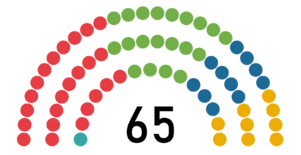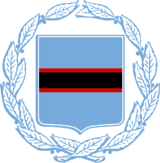Parliament of Garetolia: Difference between revisions
Jump to navigation
Jump to search
No edit summary |
No edit summary |
||
| Line 44: | Line 44: | ||
| term_length = two years | | term_length = two years | ||
| salary = £5,128 per month | | salary = £5,128 per month | ||
| voting_system1 = {{wp| | | voting_system1 = {{wp|Parallel voting}}; 70 party-list seats with a 5% threshold (7% for alliances) and 71 {{wp|runoff election|runoff}} seats | ||
| first_election1 = [[1979 Garetolian general election|1979]] | | first_election1 = [[1979 Garetolian general election|1979]] | ||
| last_election1 = [[2023 Garetolian general election|2023]] | | last_election1 = [[2023 Garetolian general election|2023]] | ||
Revision as of 21:45, 26 November 2024
Parliament of Garetolia Aka'koha re'Karātōl'ikī | |
|---|---|
 | |
| Type | |
| Type | |
| History | |
| Founded | September 24, 1978 |
| Leadership | |
Michael Stroman, Social Democratic since 18 August 2021 | |
Jay Kulisch, Social Democratic since 18 August 2023 | |
| Structure | |
| Seats | 65 |
 | |
Political groups | Government (45)
Opposition (20)
|
| Committees | 20
|
Length of term | two years |
| Salary | £5,128 per month |
| Elections | |
| Parallel voting; 70 party-list seats with a 5% threshold (7% for alliances) and 71 runoff seats | |
First election | 1979 |
Last election | 2023 |
Next election | 2025 |
| Meeting place | |
 | |
| Website | |
| www | |
| Constitution | |
| Constitution of Garetolia | |
This article is incomplete because it is pending further input from participants, or it is a work-in-progress by one author. Please comment on this article's talk page to share your input, comments and questions. Note: To contribute to this article, you may need to seek help from the author(s) of this page. |
The Parliament of Garetolia (Garetolian: Aka'koha re'Karātōl'ikī) is the unicameral supreme legislature of Garetolia. It was founded on September 24, 1978. The Parliament constitutes the legislative branch of the Government of Garetolia, enacting laws and amendments to the Constitution, passing the budget, confirming the Prime Minister and the Government and controlling their activities.
The Parliament consists of 65 biennially-elected members; 33 are elected from federal electoral districts, and 32 are elected in a nationwide vote based on open list proportional representation.
